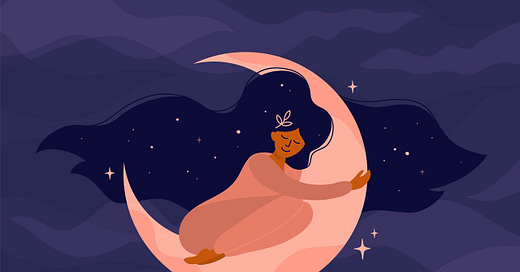I have a confession to make. Can you keep a secret? My pen has not touched paper much this week. It ebbs and flows. So this is not a scheduled-days-in-advance-very-well-prepared piece. Not by any means. I suppose I could have just not written anything at all. As I said in my first post, I’m not making any promises… But I’m not going to break promises either and that includes the one I made to myself. It’s been good for me to be held accountable here in writing something, or “drafting”, on a regular basis. So today avid my readers, let’s delve into my dreams.
No, I didn’t pick the topic of my fluctuating state of slumber purely so that I could come up with a genius Eurythmics-themed title. But yes, it has been added to the Spotify playlist.
I’ve always been curious about my dreams and have, without wanting to slip too far into the Freudian, fruitlessly tried to interpret them just as he did. What do they mean? It pains me not to have answers.
I hunted furiously high and low for a satisfying meaning of the word ‘dream’ itself. Naturally, the first Google search return did the job. Psychology Today says that ‘dreams are the stories our brains tell during sleep’. Aww cute. Stories told back to us through a series of images, ideas, emotions, and sensations. There is still so much that remains unknown about dreaming though. In equal parts, it fascinates and frustrates me. Something that everyone experiences and yet we’re still perplexed by. Thousands of years on from when civilisations first documented their interpretations of dreams and we still don’t know. We don’t even know where exactly in the brain dreams happen if it’s from one section or if multiple parts of the brain are involved. And most importantly in my mind (pun definitely intended) - we don’t know what the purpose of dreaming is. Surely, there must be a reason?!
American psychologist Calvin Hall carried out a study on dreams in the mid-twentieth century. After collecting more than 50,000 ‘dream reports’ the study concluded that anxiety was the most common emotion experienced. Interesting. In fact, about 80% of people’s dreams featured at least one “negative” experience such as sadness, anger or confusion. Versus around 50% of people’s dreams with at least one “positive” experience, such as friendship, success or happiness. With an increase in the recorded number of people experiencing and living with anxiety, depression and other mental health problems since the study took place you might wonder how different, if at all, a study today could look.
Functional dreams, prophecy and visitation are central themes across different religions and mythology too. Divine intervention. Less interpretive, more definitive. A journey to take, a mission to complete, a moral of the story. In these cases, dreams always seem to be cyclic and make sense by the end. I can’t say the same about my dreams. Like the one I had when I was younger, hanging out with Posh and Becks going to Tesco before flying to a place where we all turned into cartoons.
I do have a reoccurring theme, not a dream that revisits me as such but a plot line. The setting might be different but the general story is the same. I’m missing out on something. I’m late to the party or I’ve lost my friends. I arrive after the crescendo. I’m so close but realise I’ve forgotten something and have to turn back. No one seems to miss me if I’m not there or asks after me. Even in our conscious memories, we’re more likely to focus on and remember the negative, same goes for dreams too. When I tried to find more on recurring dreams it was a lot of falling, being chased and teeth falling out. As I write this before bed I think that’s my cue to French exit my Chrome tabs.
Some final drifting thoughts. Most dreams last between 5 and 20 minutes and on average, you dream for a total of about 2 hours a night. So during your lifetime, you’ll spend about six years lost in your dream world. Magic. You can’t control it and you’ll hardly remember any of it even happening when you wake up. I honestly have learned nothing else so that’s the end I guess.





